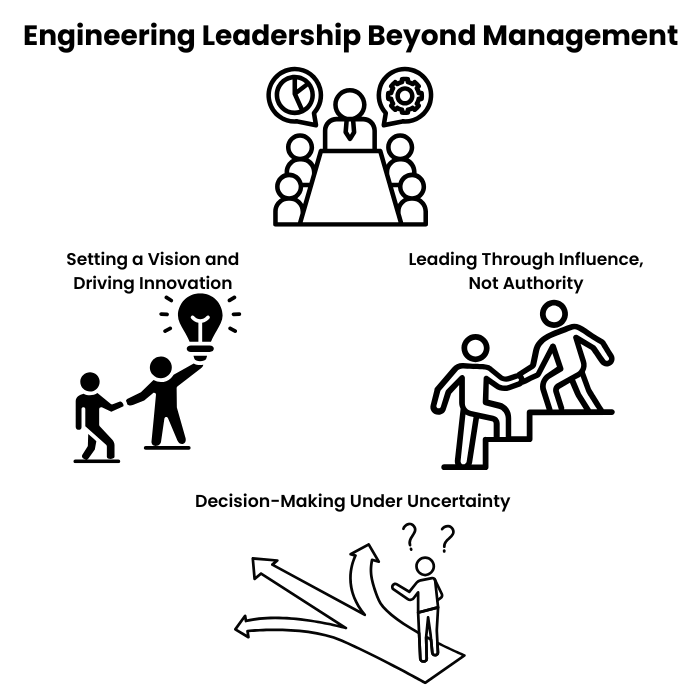Stepping into engineering management feels like jumping into a new game without clear rules. One day, you’re deep in code, solving complex problems, and the next, you’re in back-to-back meetings, making decisions that impact an entire team. It’s a shift that catches many engineers off guard.
Most engineers don’t start their careers thinking, “I want to manage people.” It just happens. You do great work and take on more responsibility; before you know it, you’re expected to lead. But here’s the catch: writing clean code and leading a team require completely different skills. Debugging a system is one thing; keeping a team motivated, meeting deadlines, and balancing business needs with technical priorities is another.
Some engineers struggle to let go of the hands-on work. Others get lost in endless meetings, unsure of how to lead. The challenge isn’t just about managing projects—it’s about guiding people, making tough calls, and creating an environment where engineers can do their best work.
So how do you balance technical execution with leadership, make decisions with confidence, and build a team that meets deadlines without burning out? That’s exactly what we’re diving into. Whether you’re new to management or refining your leadership skills, this guide will help you lead effectively and get real results.
Understanding the Core of Engineering Management
Engineering management is about leading a team, solving problems, and keeping the business moving forward. A great manager connects the technical side with the bigger picture—aligning engineering efforts with company goals while ensuring the team stays engaged and productive.
But stepping into management can feel like stepping into a whole new job. The skills that made someone a great engineer don’t always translate to leading people. That’s why understanding the shift from engineer to manager is so important. Let’s break it down.
What is Engineering Management?
Engineering managers sit at the intersection of technology, people, and business. Their job isn’t to be the best coder in the room but to create an environment where engineers can do their best work. That means setting priorities, removing obstacles, and making sure projects align with company goals.
Here’s what an engineering manager does:
- People management – Hiring, mentoring, and keeping the team motivated.
- Project execution – Making sure deadlines are met without burning out the team.
- Process optimization – Streamlining workflows so engineers can focus on what matters.
The Transition from Engineer to Manager
Many engineers step into management because they’re great at solving technical problems. But leading people is a completely different challenge. Instead of writing code, they’re making decisions that impact the team, handling conflicts, and balancing short-term project deadlines with long-term business needs.
This shift can be tough. Engineers are used to clear logic—code either works or it doesn’t. Managing people? It’s messy. Everyone has different working styles, motivations, and career goals. That’s why the mindset shift is so important.
Here’s what changes when you move from engineer to manager:
- It’s no longer just about you – Your success is measured by how well your team performs, not just your contributions.
- You solve different problems – Instead of debugging code, you’re resolving miscommunication, keeping projects on track, and making tough calls.
- Soft skills matter as much as technical skills – Communication, delegation, and decision-making become just as important as technical know-how.
Some engineers struggle to let go of coding. Others feel like they’re stuck in meetings all day, unsure of how to lead. The key? Learning to trust your team, focus on the big picture, and develop the skills that help engineers thrive.
Engineering Management vs. Leadership: What’s the Difference?
Many people use “management” and “leadership” interchangeably, but they’re not the same thing. Management is about execution—meeting deadlines, running processes, and keeping things organized. Leadership is about vision—setting direction, inspiring people, and pushing the team toward something bigger.
Think of it this way: Managers make sure things get done. Leaders make sure the right things get done.
Here’s how they differ:
- Engineering management focuses on projects, people, and processes—making sure work is completed efficiently.
- Engineering leadership focuses on strategy, vision, and innovation—guiding the team and company forward.
The best engineering managers do both. They keep projects moving while also inspiring their teams to grow, take risks, and push boundaries. That’s what separates a good manager from a great leader.
Key Skills Every Engineering Manager Needs
Engineering management isn’t about being the smartest person in the room—it’s about making sure the team has what they need to succeed. That requires a mix of technical knowledge, communication skills, and the ability to manage both people and projects effectively. Let’s break down the five key skills that every engineering manager needs to lead with confidence.
1. Technical Expertise: How Much Is Necessary?
You don’t need to be the best engineer on the team, but you do need to understand the work. Technical knowledge helps you ask the right questions, support decision-making, and build trust with your team. The challenge is finding the right balance—stay informed without micromanaging. Instead of jumping in to fix problems, focus on guiding the team and removing roadblocks.
2. Clear and Effective Communication
Great ideas and strong execution mean nothing if communication is weak. An engineering manager needs to convey expectations, priorities, and feedback. This includes:
- Upward communication – Keeping leadership informed without overwhelming them with details.
- Downward communication – Giving teams clarity on goals, roadblocks, and expectations.
- Lateral communication – Working with other teams to keep projects aligned.
Miscommunication slows teams down, creates unnecessary stress, and leads to mistakes. The best managers listen as much as they talk and ensure everyone is on the same page.
3. People Management and Team Development
Managing engineers isn’t just about keeping projects on track—it’s about helping people grow. Hiring the right talent is just the start. To keep a team engaged, managers need to:
- Set clear expectations and give useful feedback.
- Hold productive 1-on-1 meetings that benefit the engineer.
- Coach, not just manage—help engineers take ownership and grow into leaders.
A team that feels valued and challenged does better work. A team that feels ignored or micromanaged starts looking for another job.
4. Project and Process Management
A manager’s job isn’t to do the work—it’s to make sure the work gets done efficiently. That means setting priorities, ensuring smooth workflows, and eliminating blockers. The best managers:
- Use agile or other frameworks to keep teams aligned.
- Choose the right tools for tracking progress without unnecessary complexity.
- Adapt processes as needed—what worked six months ago might not work today.
Project success isn’t about working harder—it’s about working smarter.
5. Decision-Making Under Pressure
Not every decision will be clear-cut. Engineering managers deal with trade-offs—speed vs. quality, short-term fixes vs. long-term stability, innovation vs. risk. The key is making decisions with confidence. That means:
- Gathering input without getting stuck in analysis paralysis.
- Balancing technical, business, and team needs.
- Accepting that not every decision will be perfect—adjust as you go.
Strong leaders don’t hesitate forever. They make the best call with the information they have and keep moving forward.
Leadership in Engineering: Beyond Just Management

Managing an engineering team is about keeping things running. Leading one is about pushing it forward. Leadership goes beyond overseeing projects—it’s about setting a vision, inspiring people, and making tough calls that shape the future. The best engineering leaders don’t just keep the ship afloat; they steer it in the right direction.
1. Setting a Vision and Driving Innovation
Great engineering teams don’t just follow instructions—they build, improve, and innovate. But without a clear vision, even the most talented engineers can feel lost. Strong leaders:
- Align technical work with business goals so engineers understand the impact of their work.
- Encourage learning, experimentation, and smart risks instead of just playing it safe.
- Push for continuous improvement, making innovation part of the culture, not an afterthought.
The best teams aren’t just productive—they’re motivated by a shared purpose.
2. Leading Through Influence, Not Authority
Telling people what to do might get short-term results, but real leadership is about influence. Engineers follow leaders who earn their trust, not those who simply hold a title. Effective engineering leaders:
- Inspire teams by sharing the “why” behind decisions, not just the “what.”
- Motivate with purpose, not pressure—people work harder when they believe in what they’re doing.
- Build relationships across teams to create alignment and momentum.
A title might make someone a manager, but trust and respect make them a leader.
3. Decision-Making Under Uncertainty
Not every decision has a clear answer. Engineering leaders often have to choose between speed and stability, short-term fixes, and long-term investments. The best ones:
- Balance data with experience—numbers help, but gut instincts play a role too.
- Make tough trade-offs, knowing that perfect solutions rarely exist.
- Learn from failures and adapt, treating mistakes as lessons, not roadblocks.
The key isn’t avoiding mistakes—it’s making decisions with confidence and adjusting when needed.
Overcoming Common Challenges in Engineering Management
Every engineering manager runs into challenges—some expected, others completely out of the blue. The best leaders aren’t the ones who avoid problems but the ones who handle them with confidence. Let’s break down the key hurdles and how to tackle them.
1. Handling Difficult Conversations and Conflict Resolution
Tough conversations come with the job. Whether it’s underperformance, disagreements, or misalignment, avoiding issues only makes them worse. The best way to handle them?
- Be direct but fair – Address problems early before they grow.
- Stick to facts – Focus on actions and outcomes, not opinions.
- Offer solutions – Feedback should help, not just criticize.
Handled right, even tough conversations can strengthen the team.
2. Managing Remote and Hybrid Teams
With teams spread across locations, communication and collaboration get trickier. What works in an office doesn’t always translate remotely. To keep teams productive:
- Over-communicate clarity, not noise – Ensure goals and expectations are clear.
- Use the right tools – Async updates work better than endless meetings.
- Make culture intentional – Remote teams need effort to stay connected.
Great teams don’t happen by accident, especially when they aren’t in the same room.
3. Avoiding Burnout: Self and Team Well-being
Engineering isn’t just about writing code—it’s problem-solving under pressure. Without balance, teams burn out fast. To prevent it:
- Watch for warning signs – Low energy, missed deadlines, and disengagement.
- Set boundaries – No one does great work when they’re always on.
- Encourage breaks – Recovery time fuels long-term performance.
A well-rested team builds better products—overworked teams just burn out.
4. Balancing Technical Debt and Business Pressure
Engineering teams often face a trade-off—move fast or build things right. Leaders need to:
- Make trade-offs visible – Leadership should understand the impact of shortcuts.
- Prioritize fixes – Not all debt needs to be repaid immediately, but some will slow everything down.
- Defend good engineering – Fast doesn’t mean sloppy.
Short-term wins shouldn’t create long-term problems. Smart leaders know when to push back.
5. Keeping Engineers Engaged and Motivated
Engineers don’t just want a paycheck—they want interesting work and a sense of progress. A good leader makes sure they get both by:
- Giving real ownership – Let engineers solve problems, not just follow orders.
- Recognizing impact – Show how their work matters.
- Providing growth opportunities – Learning keeps people engaged.
A motivated team isn’t just more productive—they stick around.
What Engineering Leadership Skills Are Essential for Building High-Performing Teams?
Effective engineering leadership hinges on mastering leadership in technical team environments. Clear communication fosters collaboration, while empathy builds trust among team members. Leaders must also prioritize problem-solving and adaptability, ensuring that teams remain agile in the face of challenges. These skills create a foundation for high-performing and innovative teams.
How to Continuously Improve as an Engineering Leader

Good engineering leaders don’t stop learning. The best ones treat leadership like any other skill—something to refine, adjust, and improve over time. No matter how much experience you have, there’s always room to grow. Let’s break down how to keep getting better.
1. The Role of Mentorship and Networking
Leadership can be isolating if you try to figure everything out alone. The smartest leaders seek guidance from those who’ve been there before and share insights with others on the same path. Here’s how to make the most of it:
- Find a mentor – Someone outside your company can offer fresh perspectives without office politics.
- Be a mentor – Teaching others solidifies what you’ve learned and helps the next generation of leaders.
- Join professional groups – Engineering leadership forums, LinkedIn groups, and Slack communities provide support and advice.
The best leaders don’t operate in a vacuum—they stay connected and keep learning from others.
2. Staying Updated with Industry Trends
Technology doesn’t stand still, and neither should an engineering leader. But with endless blogs, podcasts, and courses, it’s easy to feel overwhelmed. Instead of chasing everything, focus on:
- Following a few key industry voices – Thought leaders, experienced CTOs, and respected engineering managers often share valuable insights.
- Listening to engineering leadership podcasts – A quick way to absorb new ideas during commutes or workouts.
- Reading case studies – Learn from real-world successes (and failures) to sharpen decision-making skills.
Staying informed isn’t about knowing every new tool—it’s about understanding what truly moves teams and businesses forward.
3. Measuring Success as an Engineering Manager
Success in engineering leadership isn’t just about shipping projects on time. It’s about building a strong, engaged team that consistently delivers. To track progress:
- Look beyond project deadlines – Consider team health, efficiency, and long-term impact.
- Gather 360-degree feedback – Insights from engineers, peers, and executives highlight blind spots.
- Self-assess regularly – Ask yourself: Is the team growing? Are processes improving? Am I making decisions with confidence?
Growth doesn’t happen overnight, but small improvements over time lead to big results.
Conclusion
Engineering management isn’t just about keeping projects on track—it’s about leading people, making smart decisions, and continuously improving. The best engineering managers don’t try to have all the answers. Instead, they create an environment where their teams can do their best work.
Strong leadership means balancing technical knowledge with people skills, communicating clearly, and making decisions with confidence. It’s about setting a vision, guiding teams through uncertainty, and ensuring engineers feel motivated and supported. Challenges will come—conflicts, tough conversations, balancing business needs with technical realities—but handling them well is what separates good managers from great leaders.
The key to lasting success? Never stop learning. Stay connected with other leaders, seek mentorship, and keep refining your approach. Leadership isn’t a destination—it’s a skill that grows with experience. Now, take what you’ve learned, apply it, and lead with confidence.




